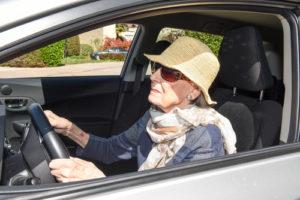
How you know when an elderly person should stop driving will depend on the senior’s abilities and health. This is often a very difficult decision that the individual must discuss with their children, grandchildren, and other loved ones.
In some cases, their doctor may recommend they stop because of their health conditions. The state may also refuse to renew a senior’s license if they are unable to pass a vision exam or receive clearance from their doctor.
Senior Driver Fatality Statistics
While teen drivers have the highest rates when it comes to accidents, injuries, and the deaths of others in accidents, seniors over the age of 80 have the highest rate of driver fatalities in accidents they caused, according to the AAA Senior Driving.
When a senior is involved in a motor vehicle accident, it puts their health in a precarious position. According to the National Highway Traffic Safety Administration (NHTSA), seniors account for about 19% of all traffic fatalities and 10% of all injuries that occur in accidents in the U.S. each year.
Keeping seniors who no longer have the physical or cognitive ability to drive from getting behind the wheel may help prevent your loved one from becoming one of these statistics.
For a free legal consultation, call 800-537-8185
Aging and Medical Conditions Can Decrease Driving Skills
Aging causes many changes in the human body. While some people experience a severe decline in health, others continue to do well for many years. Some are very sharp and remain active well into their 80s or even 90s.
Age-related declines that could affect a person’s ability to drive safely include:
- Slowed reflexes and reaction time
- Weakened muscles, poor flexibility, and loss of coordination
- Low vision, especially at night
- Hearing loss
- Slowed decision-making ability
Many elderly people also develop medical conditions that could affect their ability to drive. For example, dementia and related conditions could cause the senior to become lost or not understand how to navigate a complex intersection properly. Low blood pressure or uncontrolled diabetes could cause them to pass out behind the wheel.
State Laws Vary Regarding Senior License Renewal Process
In some cases, state governments are also taking steps to determine when an elderly person should stop driving. Many states have put laws in place that require seniors to renew a driver’s license sooner, complete a vision test with each renewal, renew in person, and possibly even have a doctor sign off on their renewal.
Seniors who have limitations because of a medical condition, such as a stroke, will almost certainly need medical approval when renewing their driver’s license.
According to the NHTSA, states also generally require drivers of a certain age to renew in person, eliminating online or mail-in options for seniors. Others may have no special rules for the elderly to renew a driver’s license.
Click to contact our personal injury lawyers today
Determining if an Elderly Person Should Stop Driving
There are many considerations to examine if you believe an aging loved one may need to stop driving. First and foremost, you will want to consider their doctor’s advice. If the doctor believes their condition or general health due to aging could hamper their driving ability, it may no longer be safe for them to drive.
Their driving record will also play a role in many cases. Some family members begin to worry about their loved one’s driving ability following a major collision or several smaller incidents. If they seem to keep making mistakes while behind the wheel, it may be time to discuss limiting their driving or finding an alternative.
In some cases, family members will notice unexplained damage to their loved one’s vehicle, which will raise questions. If your parent or other loved one is damaging their vehicle and not remembering when or how, it may be because of parking lot accidents, minor fender benders, and other incidents. Not remembering them or reporting them is a red flag.
Many seniors recognize their driving abilities are not what they once were, but they may not want to give up driving. This often comes across as reluctance to drive despite continuing to get behind the wheel. You may be able to offer alternatives or limit their driving to help put both of your minds at ease.
Let the Team from Morris Bart, LLC Review Your Case
If you were hurt in a traffic accident because of an elderly driver, or if you were the elderly driver hurt in an accident, the Morris Bart law firm may be able to help.
You could qualify to recover compensation if another motorist caused your collision. Call (800) 537-8185 now to get started with your free case review.
Questions?Call 800-537-8185
to find a Morris Bart office near you.

